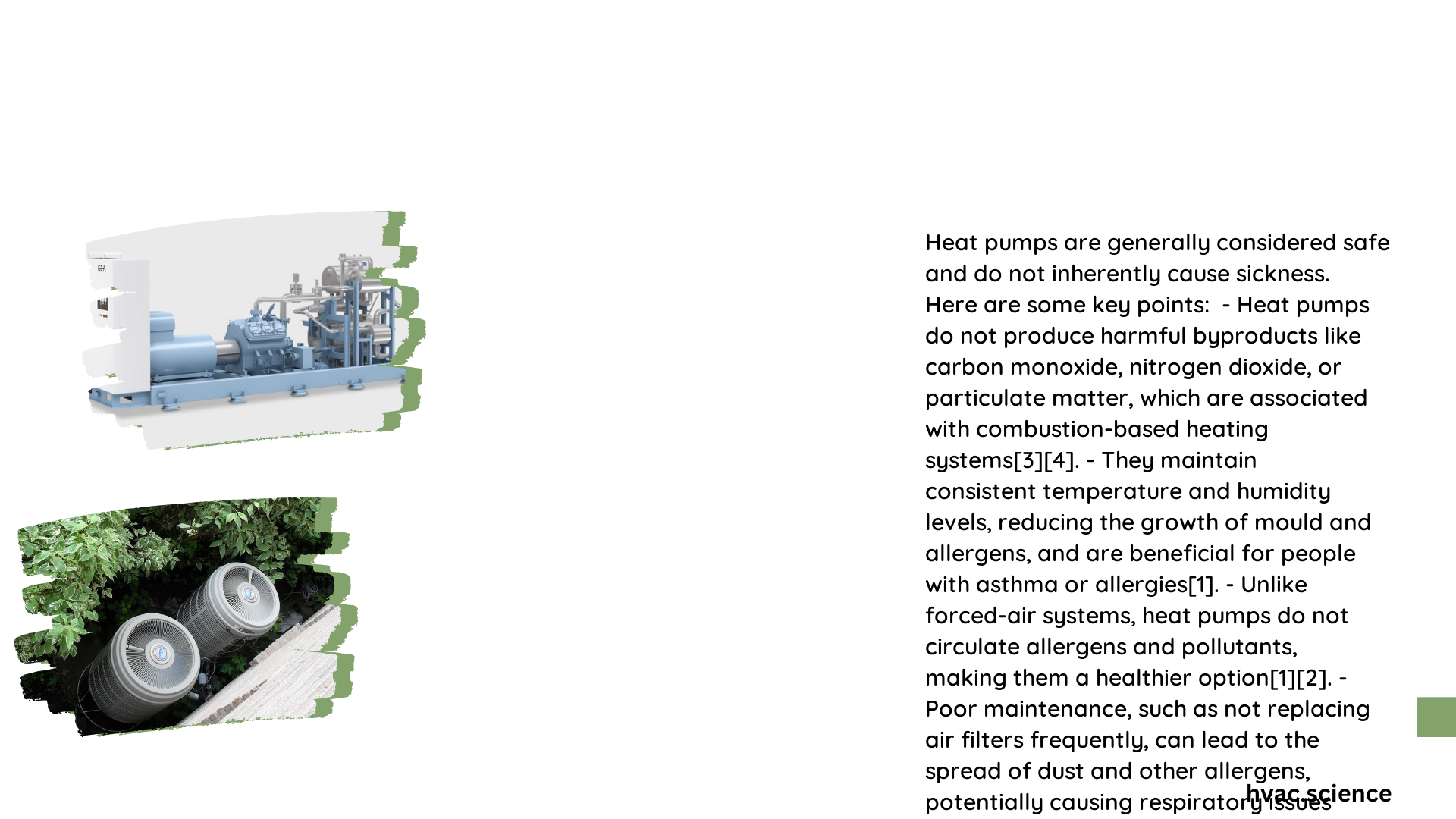Heat pumps are generally considered a safe and efficient heating and cooling option. However, improper maintenance or certain conditions can potentially lead to health issues. This article explores the relationship between heat pumps and potential health risks, addressing concerns about indoor air quality, allergens, and respiratory problems. We’ll examine specific health risks, impact on air quality, types of pollutants, and mitigation techniques to ensure a healthy living environment.
What Are the Specific Health Risks Associated with Heat Pumps?
While heat pumps are designed to improve indoor comfort, they can pose certain health risks if not properly maintained:
-
Respiratory Issues: Poorly maintained heat pumps can exacerbate existing respiratory conditions such as asthma, allergies, and bronchitis.
-
Mold Exposure: Heat pumps can become breeding grounds for mold, especially in humid environments. Common mold types include:
- Aspergillus
- Penicillium
-
Cladosporium
-
Bacterial Growth: Damp conditions in heat pump systems can promote the growth of bacteria like:
- Legionella
- Pseudomonas
-
Mycobacterium avium complex (MAC)
-
Carbon Monoxide Risk: Hybrid heat pumps that use gas as a backup heating source can potentially produce carbon monoxide if not properly maintained or ventilated.
-
Allergen Circulation: If filters are not regularly changed, heat pumps can circulate allergens like dust, pollen, and pet dander throughout the home.
How Does a Heat Pump Impact Indoor Air Quality?

Heat pumps can have both positive and negative effects on indoor air quality:
Positive Impacts:
- Operate without burning fuel, reducing harmful byproducts
- Maintain stable temperature and humidity levels
- Can improve air quality for those with asthma or allergies when properly maintained
Negative Impacts:
- Can circulate allergens and pollutants if not properly maintained
- May worsen allergy symptoms and respiratory issues if filters are clogged
What Types of Allergens and Pollutants Can Heat Pumps Circulate?
Heat pumps can potentially circulate various allergens and pollutants:
- Mold Spores:
- Aspergillus
- Penicillium
- Cladosporium
-
Stachybotrys Chartarum (Black Mold)
-
Bacteria:
- Legionella
- Pseudomonas
-
Mycobacterium avium complex (MAC)
-
Airborne Particles:
- Pollen (e.g., ragweed)
- Dust mites
-
Pet dander
-
Other Pollutants:
- Volatile Organic Compounds (VOCs)
- Particulate matter
What Are Effective Mitigation Techniques for Heat Pump-Related Health Risks?
To minimize health risks associated with heat pumps, consider the following mitigation techniques:
- Regular Maintenance:
- Schedule annual professional inspections
- Clean or replace air filters every 1-3 months
-
Keep outdoor units clear of debris
-
Advanced Filtration Systems:
- Install high-efficiency particulate air (HEPA) filters
-
Consider using activated carbon filters for VOC removal
-
Humidity Control:
- Use a dehumidifier in conjunction with your heat pump
-
Maintain indoor humidity levels between 30-50%
-
Proper Ventilation:
- Ensure adequate air circulation throughout your home
-
Use exhaust fans in bathrooms and kitchens
-
Regular Cleaning:
- Dust and vacuum frequently to reduce airborne particles
- Clean air vents and registers regularly
What Are the Cost Implications of Maintaining a Healthy Heat Pump System?
Maintaining a healthy heat pump system involves various costs:
- Regular Maintenance Costs:
- Air filter replacements: $10-$50 per filter (every 1-3 months)
-
Annual professional tune-ups: $100-$300
-
Upgrade Costs:
- Advanced filtration systems: $500-$2,000+
-
High-efficiency heat pump models: $3,000-$7,500+
-
Energy Savings:
-
Properly maintained heat pumps can reduce energy costs by 10-25%
-
Health-Related Savings:
- Reduced medical expenses related to respiratory issues and allergies
- Improved quality of life and productivity
How Can You Determine if Your Heat Pump is Causing Health Issues?
If you suspect your heat pump may be causing health problems, look for these signs:
- Increased Allergy Symptoms:
- Sneezing
- Runny nose
-
Itchy eyes
-
Respiratory Issues:
- Coughing
- Wheezing
-
Shortness of breath
-
Unexplained Headaches or Dizziness:
-
Could indicate poor air quality or potential carbon monoxide exposure
-
Visible Mold Growth:
- Around air vents
-
On walls or ceilings near the heat pump
-
Musty Odors:
- Persistent unpleasant smells when the heat pump is running
If you experience any of these symptoms, consult with a healthcare professional and have your heat pump system inspected by a qualified technician.
What Are the Long-Term Health Benefits of a Well-Maintained Heat Pump?
Properly maintained heat pumps can offer several long-term health benefits:
- Improved Indoor Air Quality:
- Reduced exposure to allergens and pollutants
-
Better overall respiratory health
-
Consistent Temperature and Humidity Control:
- Reduced risk of mold and mildew growth
-
Improved comfort and sleep quality
-
Energy Efficiency:
- Lower energy bills
-
Reduced carbon footprint
-
Reduced Exposure to Harmful Gases:
-
No combustion byproducts like carbon monoxide
-
Enhanced Overall Well-being:
- Fewer allergy and asthma symptoms
- Improved cognitive function and productivity
By understanding the potential health risks associated with heat pumps and implementing proper maintenance techniques, you can ensure a healthy and comfortable living environment. Regular upkeep and attention to air quality can help prevent heat pump-related health issues and promote long-term well-being for you and your family.
References:
1. Can Heat Pumps Make You Sick? – GAC Services
2. Hidden Dangers: Mold and Bacteria in Your Mini Split Heat Pump
3. Heat Pumps: Understanding Their Role in Your Health – Rinnai
